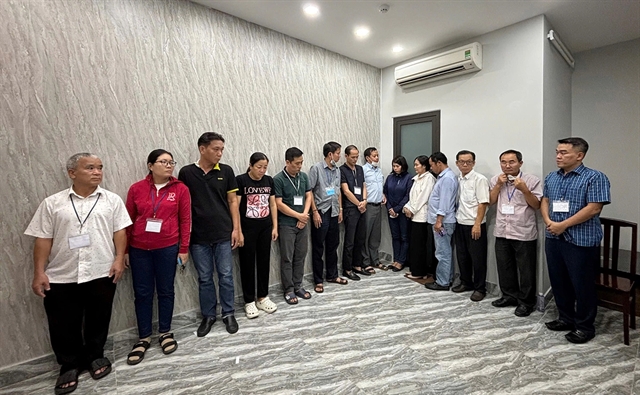 Society
Society

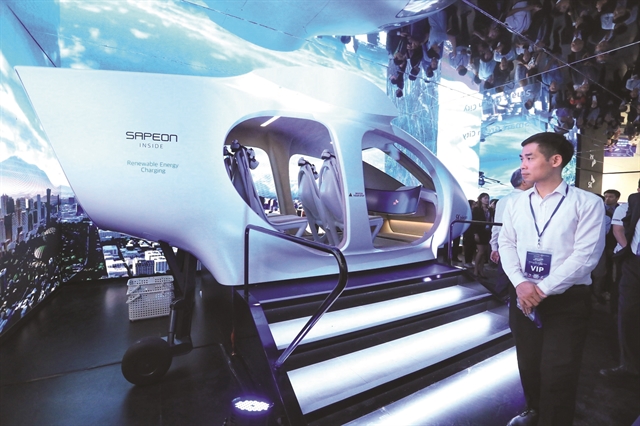 |
| HIGH-TECH: A model on display at the 2023 Việt Nam Innovation International Exhibition on October 28, 2023 at Hòa Lạc High-Tech Park in Thạch Thất District, Hà Nội. VNA/VNS Photo Tuấn Anh |
HÀ NỘI — The Vietnamese science and technology sector saw many memorable highlights in 2023, notably an increase in the Global Innovation Index.
Việt Nam has joined the race to develop global semiconductor technology, had the first scientist to win the VinFuture award, and seen an explosion of AI with the Vietnamese desire to localise ChatGPT.
In October 2023, the Global Innovation Index report announced that Việt Nam increased two places, from 48th to 46th, out of 132 countries and economies.
Việt Nam is second in the group of lower middle-income countries, only behind India.
The Global Innovation Index takes the pulse of innovation against a background of an economic and geopolitical environment fraught with uncertainty. It reveals the most innovative economies in the world, ranking the innovation performance of 132 economies while highlighting innovation strengths and weaknesses.
Envisioned to capture as complete a picture of innovation as possible, the index comprises around 80 indicators, including measures on the political environment, education, infrastructure and knowledge creation of each economy.
Việt Nam's ranking increase was recorded in the input index, consisting of human resources and research; infrastructure; market development level and business development level.
For the output index, there are two pillars: technology products and creative products.
Minister of Science and Technology Huỳnh Thành Đạt said that Việt Nam's innovation start-up ecosystem was on a positive development trend.
The country has 20 local innovation support centres, more than 1,400 organisations capable of supporting start-ups, and more than 170 universities organising start-up activities.
Also, in October 2023, the National Innovation Centre was put into operation to promote rapid, sustainable growth based on science, technology and innovation.
Semiconductor race
2023 also marks Việt Nam's step forward in the semiconductor chip industry. Firstly, the new operating facility of the National Innovation Centre was put into use to gather, lead, connect and perfect the national innovation ecosystem.
The US President Joe Biden's visit to Việt Nam in September promised to launch human resource development initiatives in the semiconductor sector for Việt Nam.
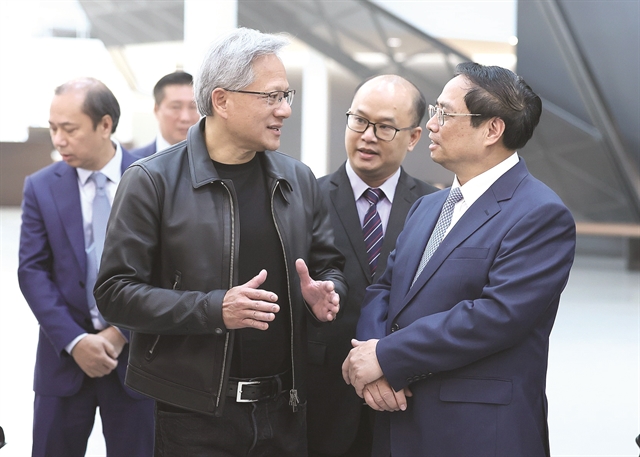 |
| IN DISCUSSION: President and co-founder of NVIDIA Jensen Huang (left) speaks with Prime Minister Phạm Minh Chính (right) about NVIDIA company in San Francisco, California, the United States, in December, 2023. VNA/VNS Photo Dương Giang |
During Prime Minister Phạm Minh Chính's visit to the US in September, several agreements were also signed with major US semiconductor companies to build research and personnel training centres in Việt Nam.
In addition to Intel, Amkor and Hana Micro also announced investments of $1.6 and $1 billion, respectively, in chip production in Việt Nam.
In the sci-tech sector, Viettel Group successfully deployed the world’s first 5G transceiver station, following Open RAN standards. Viettel is also the first partner in the world to deploy Qualcomm products into the network with real users, downloading real data.
This is a breakthrough not only in Việt Nam but also in the world because it only took Viettel eight months from the time Viettel and Qualcomm announced strategic cooperation on 5G to the success of the real network.
First Vietnamese wins VinFuture award
Professor Võ Tòng Xuân, 83, of Nam Cần Thơ University became the first Vietnamese scientist to be named at the VinFuture Award last year.
The VinFuture Award was initiated in 2020 and is awarded annually to breakthrough scientific and technological inventions that have the potential to create meaningful change.
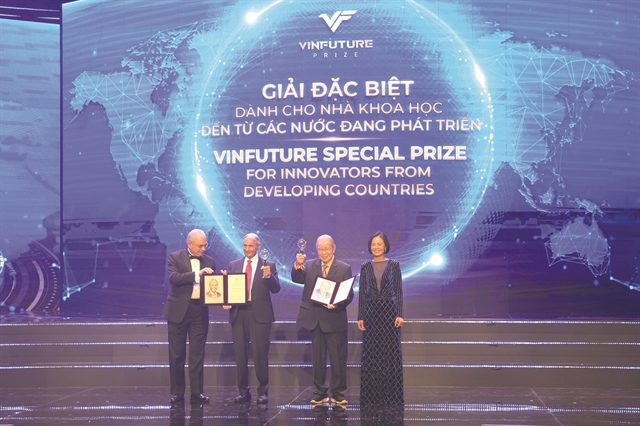 |
| AWARDED: Indian American Professor Gurdev Singh Khush and Vietnamese Professor Võ Tòng Xuân (second, right) receive the 2023 VinFuture Special Prize for Innovators from Developing Countries for their significant contributions to the invention and advancement of disease-resistant rice varieties. Photo courtesy of the organiser |
Xuân, along with Professor Gurdev Singh Khush - an Indian-American scientist, was honoured by the VinFuture Special Prize 2023 for scientists from developing countries with a prize of $500,000.
The two scientists were honoured for researching and disseminating disease-resistant rice varieties, contributing to ensuring global food security.
Xuân is considered the "father" of many delicious rice varieties of the Mekong Delta. He also specialises in supporting food security issues for countries in the region.
During the agricultural revolution, he played an important role in disseminating the IR36 rice variety in areas that were frequently attacked by pests in the Mekong Delta and collaborating with local farmers to apply advanced transplant techniques.
Also in December 2023, Research.com, a reputable electronic information portal for world scientists, announced the ranking of rising scientific stars in the world.
Among the list, there were five Vietnamese scientists: Trần Xuân Bách (Hà Nội Medical University, ranked second in the world); Trần Nguyễn Hải (Duy Tân University, ranked 603rd), Thái Hoàng Chiến (Tôn Đức Thắng University, 621st), Phùng Văn Phúc (Hồ Chí Minh City University of Technology, 762nd) and Hoàng Nhật Đức (Duy Tân University, 968th).
In this ranking, Research.com reviewed data from 166,880 scientists, with the world's leading publication and citation productivity, using data from Google Scholar and Microsoft Academic Graph.
Localising ChatGPT
ChatGPT developed the Generative AI fever in Việt Nam. Since the beginning of 2023, although OpenAI has not deployed the chatbot in Việt Nam, many Vietnamese people were willing to spend hundreds of thousands of đồng to buy accounts and use virtual IPs to experience it.
Before the wave of applications and popularity of the chatbot, local universities and the Ministry of Education and Training organised dozens of seminars to discuss how to respond to the AI fever.
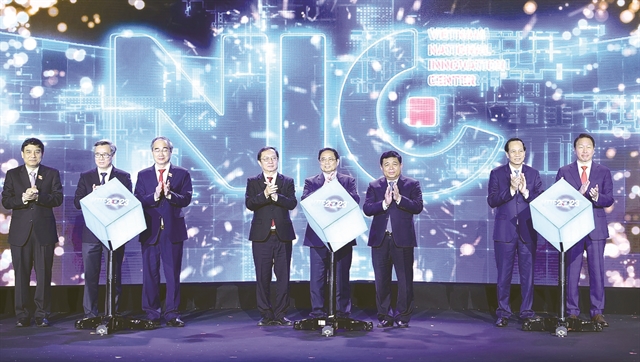 |
| INNOVATORS: Prime Minister Phạm Minh Chính (5th left) attends the inauguration ceremony of the National Innovation Centre at Hòa Lạc Hi-Tech Park, Thạch Thất District, Hà Nội. VNA/VNS Photo Dương Giang |
Besides this, applications that turn selfies into avatars like Remini, or Loopsie's anime-style photos continuously surpassed social media platforms to top the list of most downloaded applications in Việt Nam on the App Store.
In early December, VinAI introduced the PhởGPT model with 7.5 billion parameters. According to the VinAI’s representative, the project aims to develop models similar to ChatGPT for Vietnamese language and Vietnamese culture.
PhởGPT can read and write following Vietnamese style. The model is also trained at the beginning with the Vietnamese data set, and it is independent of other models in the world.
Continuing its success, VinAI continues to launch the Vietnamese version of ViGPT software technology for end users and businesses, focusing on Vietnamese content.
ViGPT application focuses on content such as law, history, culture, landscapes and regional characteristics. Users can get the limited experience version of ViGPT, using Vietnamese on the website, similar to ChatGPT.
Along with the end-user version, ViGPT will launch an enterprise version, integrated into the multi-cognitive AI platform VinBase 2.0. It expects the application to contribute to changing operating habits and increasing business efficiency, marketing, customer service, and risk management for businesses.
Việt Nam also prompted cooperation with many top scientists and entrepreneurs in global AI, such as Professor Andrew Ng, founder and CEO of Landing AI, and Jensen Huang, CEO of Nvidia.
During his visit in early December, Jensen Huang said that Việt Nam had all the ingredients to grow AI, including data, infrastructure and abundant IT human resources.
"This is Việt Nam's opportunity. If Việt Nam can ride the wave of AI, the country will grow, prosper, and get opportunities. I believe Việt Nam can do this," he said. – VNS




